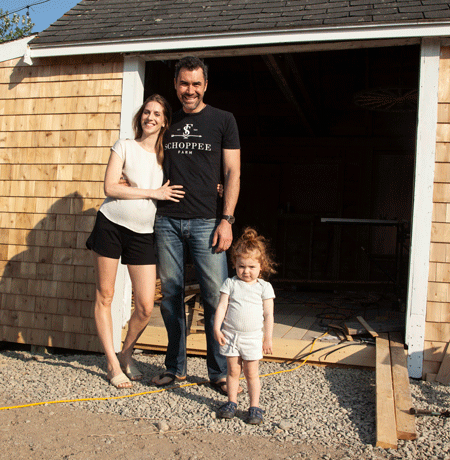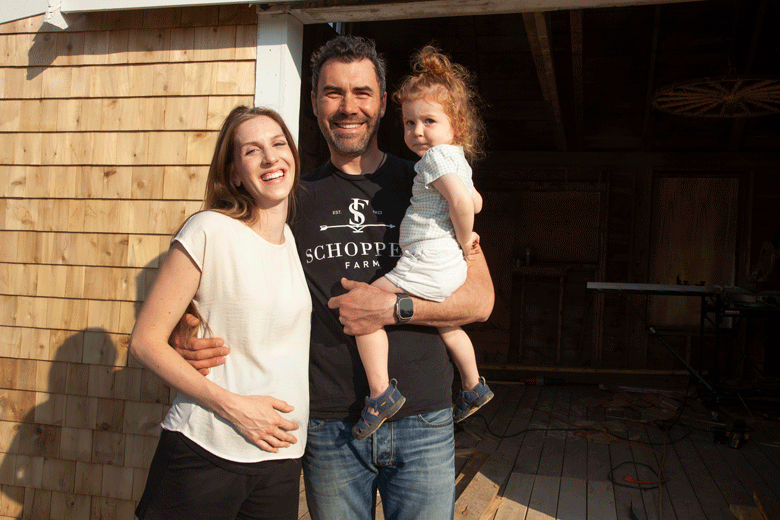
If you ask Bill Kitchen what’s going well in Machias, you’ll need to sit back because you’ll be listening for a while. Kitchen is a passionate booster for the shire town of Washington County. In fact, five years ago, during his campaign for a seat on board of selectmen, Kitchen penned an op-ed titled, “What’s Right with Machias.”
He won in a landslide, and he hasn’t changed his position yet.
“I knew it had become fashionable to say how downtrodden and poor we are in Machias, and once you slip into that, it’s very hard to get out of,” says Kitchen, who for two years has served as Machias town manager. “The point of that letter was to say, look, most of the pieces are already in place.”
Those pieces include what Kitchen calls the town’s “signature assets,” like the Machias Dike, where vendors set up impromptu flea markets along Route 1, and Bad Little Falls Park, which wraps around twin waterfalls in the center of town, and the Machias Wild Blueberry Festival, now in its 46th year and set for Aug. 18-20.
They also include key infrastructure, like the expanding Machias airport, where planning is underway to construct a longer runway, as well as Down East Community Hospital, and the University of Maine at Machias, standing high on College Hill since 1909.
“I love the people, I love the land, and I love the scenery, and we want to put our money to work here.”
—Chris Meroff
Even with these assets, Kitchen acknowledges that by another measure, Machias is a poor town. In fact, according to the latest five-year data from American Community Survey, it’s the poorest town in Maine, with an average median income hovering just above $20,000 a year, compared to almost $65,000 statewide. At least in part, Machias’ low number is explained by the concentration of low-income housing units located near the services it offers.
But no matter the reason, it’s a number that motivates Kitchen. Working in his office just a stone’s throw from the Middle and Machias rivers, he waves his arm across a map of Machias, the smallest town in Washington County, and lays out the question he’s always working to answer—how can he create a more vibrant Machias without raising taxes?
“Here we are, the service center of this county that is bigger than some states, and yet we’ve only got 14.8 square miles to work with. And a lot of that is already in use by entities that pay little or no taxes,” Kitchen says. “There are very limited amounts of space in which to build, assuming you have people that want to build here.”
Chris Meroff wants to build in Machias. He fell in love with the area in the late 1990s while visiting with his grandparents. For years now, he’s made his home here for five months of the year, spending the rest of his time in Austin, Texas, running his 30-plus businesses and venture capital firm.
But one day, Meroff and his wife would like to retire to Machias. Before they can, he says, he has some investments to make, and his end goal is nothing short of “flipping Machias.”

“I love the people, I love the land, and I love the scenery, and we want to put our money to work here,” says Meroff. “I have flipped homes, I have flipped businesses, and now for me, it’s time to flip Main Street.”
The Meroffs’ investments in Machias are already almost too numerous to count and still growing. Four years ago, they started work on a 65-acre farm in the rural Kennebec District, where today they operate the Coffee + Crisp Cafe at West Branch Farm, overlooking the West Branch of the tidal Kennebec River and acres of blueberry barrens. Below it sprawls a large white tent, which will host multiple weddings this summer, until it is replaced by a two-story event venue modeled on a 1925 chicken barn.
A you-pick apple orchard is planted, an enormous catering kitchen is under construction now, mini-cattle and ducks are en route for the petting zoo, and a master organic gardener has been retained to oversee next year’s gardens, which will supply all of it, including a mercantile for shoppers, with food.
To say nothing of Meroff’s near-term plans for a drive-through coffee shop, a large Machias lumber mill, or the creation of a global lifestyle brand, Maine Woods Outfitters, planned for another retail location in Machias and, quite possibly, to be the subject of a reality TV show.
“Machias’s downtown is why I’m doing this,” says Meroff. “We’ve seen this work in rural towns in Texas that have the same isolation issues, but they don’t have bones like Machias.”
Valdine Atwood, widely acknowledged as the unofficial town historian of Machias, knows everything about its good bones.
Fittingly, her home stands downtown near Machias’ best-known historic site, the Burnham Tavern, where in 1775 local patriots hatched plans to capture a British warship and its crew. They succeeded, and the Battle of the Margaretta is now celebrated as the first naval battle of the American Revolution. Every June, the Machias Historical Society sponsors the Margaretta Days Festival and Craft Fair, complete with reenactments of the famous battle.
When she and her family moved to Machias in 1962, Atwood recalls large numbers of retail shops lining Main Street, including two dress shops and two shoe stores, plus the local bureau of the Bangor Daily News, where she and six others reported the news from Washington County.
“You did not have to leave Machias at all to get what you needed,” Atwood recalls. “At one time, there were five car dealerships in Machias.”
David Whitney agrees that, like almost everywhere, today there is less retail on Main Street, but says there is also growth happening here. And Whitney has a lengthy perspective. His family moved Downeast in the 1700s, and his grandparents and his father operated one of the car dealerships at the base of College Hill.
Today he runs Whitney’s Tri-Town Marine in the same location, selling boats and, more recently, lots of ATVs, including the Argo line, which features a popular amphibious model.
“I’ve always been concerned about Machias’s primary revenue-generating industries, like blueberries and lobsters. We have no control over pricing…”
—Ben Edwards
“We’ve added this Argo dealership, and we are hovering between fourth and fifth in volume across North America out of 300 dealerships,” Whitney says. “And we’ve been at it for less than a year.”
Some of those sales are to locals, but many are not. That’s a model Whitney and many other local business owners aim for because it brings in outside money and employ local people.
“Most of the revenues that we generate in all of my companies come from outside Washington County,” says Whitney, who also owns Machias Glassworks, Downeast Packaging Solutions, and Whitney Wreath, a large balsam wreath company which enabled him to move home from Boston for good, in his early 20s.
“And since that time, I have struggled happily. And the struggles are real, and they are continual, and they are many,” says Whitney. “But first and foremost, my entrepreneurial attitude has always been one of optimism. I’ve listened to local pessimistic viewpoints, and I’ll have nothing of it.”
Whitney’s optimistic outlook and diversified business strategy are shared by many investing time and money in Machias today, like Sandi Malagara and her husband Ryan, who moved here from Connecticut almost 20 years ago. They run multiple businesses from Crows Nest Shops on Dublin Street, including a gift shop, Expressions Floral, a gourmet bakery, an electronics store, a shipping outlet, and the headquarters for Ryan’s drone videography business, Drones Eye View, in steady demand by Maine realtors.
“Right from the beginning, we’ve looked around to see what was missing. We asked, ‘What can’t we get here?’” Sandi recalls. “And then we would fill that need. Then once we’d gotten that piece established, we’d say, ‘What else?’”
This year, the Malagaras have added ATV rental to their business list, including an Argo they purchased from Whitney’s Tri-Town. They join another new business, Downeast Adventures, which this spring opened an ATV rental company to cater to a growing sector interested in the Downeast Sunrise Trail, an 87-mile multi-use offroad trail that carries walkers, bikers, and ATV riders from Ellsworth to Calais, by way of downtown Machias. The trail was at the center of June’s Machias ATV Jamboree.

Diversification was also on Ben Edwards’ mind when, in 2019, he decided to start a business on his family’s 200-year-old Machias farm, Schoppee Farm. Visiting from England, where he worked, Edwards met and fell in love with his now-wife, Allison, and knew he wanted to make his living in Machias in a way that might help the region, too.
“I’ve always been concerned about Machias’s primary revenue-generating industries, like blueberries and lobsters. We have no control over pricing, no manufacturing, and we take the smallest piece of the pie,” says Edwards. “I knew I wanted to form a primary industry that generated revenue from outside Downeast Maine, and the farm seemed like my platform to do that.”
Today the Edwards have diversified Machias’ business portfolio with their organic line of CBD oil products grown and manufactured on the farm. But a few close calls with state hemp legislation showed Edwards they needed to diversify their own offerings, too.
“I had been looking for other business opportunities because I realized how fragile my position was. An act of the legislature could put us out of business,” Ben recalls. “That’s what led me to purchase the elderberry business last summer.”
Now, as owners of Seattle Elderberry, Schoppee Farm manufactures its products, too, sourcing organic elderberries from other Maine farmers while they work toward growing their own. But they’re not stopping there. This summer, in the farm’s original milking shed, they’ll open a cafe, including a French-inspired bakery, enlisting the talents of Chef Ross Florance.
“One of the things I thought I was giving up when I moved here was a cafe,” says Edwards, who recently sat down with Meroff to share ideas. “The overall attitude of collaboration in Machias is entirely different from what I remember as a child, and I think it looks better than I have ever seen it. That might be in contrast to things looking relatively dire, but I think what Bill [Kitchen] and some of the other local people have done has not only turned things around but really built some momentum for Machias.”
In June, Edwards was elected to the Machias Board of Selectmen, where he joins another local son who moved home to invest in Machias. Selectman Jake Patryn works as director of operations for Acadian Seaplants and, together with his fiancée Morgan-Lea Fogg, farms sugar kelp and manufactures a line of kelp products under the brand Nautical Farms.
“When we showed up saying we were going to start a seaweed farm, people thought we were insane. But now there’s a growing interest, which is exciting,” says Fogg. “There’s a need to figure out how to continue our working waterfront that doesn’t rely on only one product.”
In June, Patryn and Fogg opened their first storefront stocking Nautical Farms’ line of kelp-based food and bath products, as well as books and other seaweed-related gifts.
For Patryn, doubling down on Machias was an easy decision.
“Machias has always been a part of me. I knew I didn’t want to leave again, so I started to think, how can I get more involved?” Patryn says, recalling what led him to run for selectman. “A big part of it is Bill Kitchen. I have a lot of respect for Bill, and as a leader, he really makes me want to be there beside him and help in any way that I can.”
Kitchen, whose background is not in municipal management but corporate and brand strategy, says he thinks of himself as Machias’ cheerleader, facilitator, and expediter rolled into one.
“It’s my job to get everybody to believe to a point where they are willing to invest their money and their time because it takes both,” he says. “Nobody wants to rearrange the deck chairs on the Titanic. I think that for a long time, people felt this was a listing ship, and that’s changed. I think we have reached a point of critical mass.”
Sarah Craighead Dedmon is editor of the Machias Valley News Observer and a contributor to The Working Waterfront.





